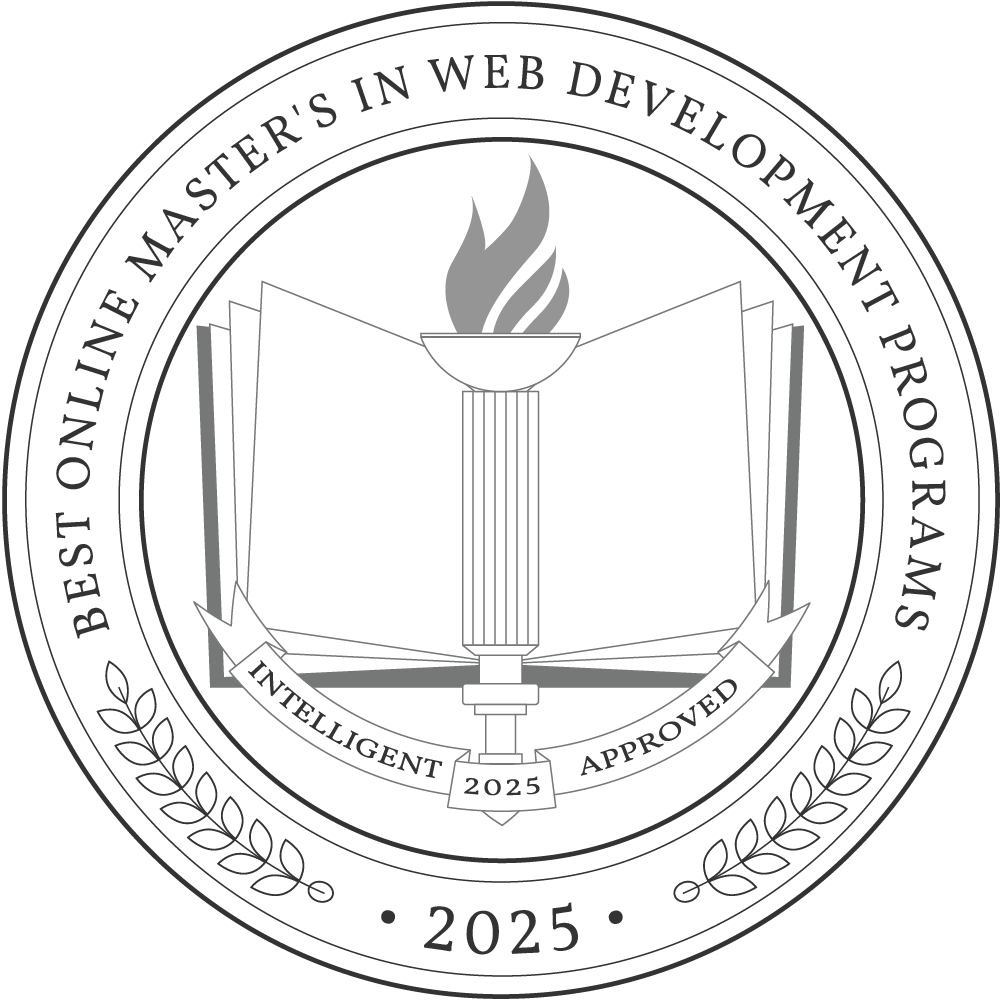Web developers are essential to the continued growth of the digital market. These individuals are responsible for website and mobile application construction, design, and functionality. According to the Bureau of Labor Statistics, employment opportunities for trained web developers are on the rise, and individuals with these valuable skills make an average salary of $92,750.
In the tech world, graduate degrees aren’t always necessary for gainful employment, but these academic credentials expand your job prospects and earning potential. Online master’s in web development programs help students specialize in a specific technology and advance into organizational leadership roles.
A typical online graduate degree in web development requires 30 to 45 credit hours (10 to 15 courses); full-time attendees need 16 months to two years to graduate. Program cost varies, but the average annual tuition for graduate degree programs is $20,513.
Why You Should Trust
The Intelligent.com Higher Education Team is dedicated to providing students with independent, equitable school and program rankings and well-researched resources. Our expert-driven articles cover topics related to online colleges and programs, paying for school, and career outlooks. We use data from the U.S. Department of Education’s College Scorecard, the National Center for Education Statistics, and other reputable educational and professional organizations. Our academic advisory team reviews content and verifies accuracy throughout the year for the most current information. Partnerships do not influence rankings or editorial decisions.
- Analyzed over 2,000 national, accredited, and nonprofit colleges and universities
- 800+ rankings pages are reviewed and updated yearly
- Content is informed by reputable sources, surveys, and interviews with academic advisors and other experts
- Over 100 data points are reviewed for accuracy and quality throughout the year, including sources
How we rank schools
Our list features the best online Web Development degree programs at top colleges nationwide. Each school featured is a nonprofit, accredited institution — either public or private — with a high standard of academic quality for post-secondary institutions.
We evaluated each school’s program on tuition costs, admission, retention and graduation rates, faculty, reputation, and the student resources provided for online students. We collected data from trusted sources like the National Center for Education Statistics, individual school and program websites, school admissions counselors, and other data sources. Then, we calculated the Intelligent Score on a scale of 0 to 100 based on the following criterion:
Academic Quality:
- Admission rate versus enrollment rate
- Retention rate of students who return after year one
- Accreditation status (regional and programmatic)
- Nonprofit status, both private and public institutions
Graduation Rate
- Overall graduation rate
- Total number of currently enrolled students, including diversity metrics
- Student-to-faculty ratio
Cost and ROI
- In-state and out-of-state per-credit tuition rates and fees
- Required credits to graduate
- Earning potential after graduation
- Availability of federal student loans, scholarships, and other financial aid options
Student Resources
- Available student services for online-only and hybrid programs
- On-campus amenities like tutoring centers and the number of libraries
Read more about our ranking methodology.
Best 3 Accredited Online Master’s in Web Development Programs
FiltersInstitution Type
Status
- Intelligent Score
- Alphabetically By University Name
- Acceptance Rate
- Enrollment
- In-state Graduate Tuition
- Out-of-state Graduate Tuition
- In-state Undergraduate Tuition
- Out-of-state Undergraduate Tuition

University of Denver
Intelligent Score: 97.15In-state: $52,596
Out-of-state: $52,596
In-state: $52,596
Out-of-state: $52,596
SAT: 1170-1360
ACT: 26-31
$834
Online
Higher Learning Commission
48

Boston University
Intelligent Score: 91.83In-state: $56,854
Out-of-state: $56,854
In-state: $56,854
Out-of-state: $56,854
SAT: 1310-1500
ACT: 30-34
$550 - $975
Online, On-Campus
New England Commission of Higher Education
40

Fort Hays State University
Intelligent Score: 91.52In-state: $4,140
Out-of-state: $14,580
In-state: $3,726
Out-of-state: $3,726
SAT: N/A
ACT: N/A
$319
Online, On-Campus
Higher Learning Commission
30
How to Choose an Online Master’s in Web Development Program
Choose your area of study
The most common graduate degree in web development is a Master of Science (MS), though some programs offer a Master of Arts (MA) or Master of Professional Studies (MPS). Exact degree names vary slightly (such as an MS in computer information systems or an MS in information technology), but the primary coursework is relatively similar across programs.
Some programs allow you to select a concentration and focus your studies on a particular niche in this field, such as web design, mobile applications, or full-stack development. If you already know what you would like to do after you graduate, look for programs that closely match these career goals.
Research schools and programs
You should only apply to institutions that have been approved by a DOE-recognized regional accrediting organization, such as the New England Commission of Higher Education or Northwest Commission on Colleges and Universities. These organizations evaluate schools to ensure they provide students with a high-quality education. Those who attend a school that isn’t regionally accredited may be unable to access financial aid or transfer credits to another institution if needed.
Ideally, your master’s in web development program will also be accredited by a respected industry group like the Accreditation Board of Engineering and Technology (ABET). This programmatic accrediting organization has particularly high standards for technology education.
Also, you should research what support services are included in your tuition. You should have access to tutoring, mental health counseling, disability accommodations, academic advising, mentorship opportunities, library databases, and technical support.
To learn more about any schools that you’re interested in, you can visit the school’s website, contact an admissions counselor, follow the school on social media, or attend an in-person or virtual open house.
Prepare for tests and applications
Application requirements vary by school and program. Few web development graduate programs require standardized test scores, but assembling your other application materials takes time. Prepare well before application deadlines, especially when requesting letters of recommendation and undergraduate transcripts. You may need to write a personal statement as well. International candidates will have additional steps, including English language proficiency testing and residency requirements.
Before submitting an application, always contact an admissions counselor to ensure you have the most accurate information regarding requirements and deadlines.
Select your program
Before making your final decision, review your needs and goals again. Do you plan to attend school full-time or part-time? Do you want your program to be as online as possible, or are you fine with a hybrid program that has a fair amount of in-person requirements? Some programs offer asynchronous courses, which can be completed at your own pace, while others only offer synchronous courses, which involve remotely attending lectures and completing assignments at the same time as other students — which of these two online learning formats do you prefer? Your school should accommodate your scheduling needs and learning preferences.
Determine how you’ll pay for your degree
Most program websites include the per-credit price of tuition. However, this is rarely a reflection of the actual cost. Schools may charge additional student services and technology fees. Seek funding opportunities wherever you can. Start by completing the FAFSA; master’s students may be eligible for federal grants and affordable loans. Then, speak with a financial aid counselor through your school. You may qualify for military discounts, need-based scholarships, or other financing options. Those who already work in the field should see if their employer offers tuition assistance benefits as well.
What Can You Expect from an Online Master’s in Web Development Program?
Students enrolled in an online master’s in web development program further their expertise in computer science and strategic technical design. Participants engage in interactive coursework to help them master in-demand skills for the modern workforce.
Throughout their study, attendees develop a portfolio of web development projects demonstrating their mastery of UX principles and web design. Graduates of online web development programs will also possess the communication and planning skills required for leadership positions within the industry.
In most cases, full-time students will graduate in less than two years; part-time students may need between two and three years. Online web development degrees are almost entirely online with no in-person commitments or internships; coursework and activities translate easily into a remote environment.
Potential courses you’ll take in an online master’s in web development program
- Technology Leadership. Students develop a broad perspective on how technology integrates within modern organizations. Participants learn the necessary communication and planning skills to advance into leadership roles with a company, such as creating an overall technology vision, implementing a technical strategy, and managing a budget.
- Web Development with PHP. Participants focus on strategies for programming web applications using mainstream languages and tools (including HTML, CSS, PHP, and MySQL). Students engage in unit testing, debugging, security issues, and object-oriented programming.
- Introduction to Probability and Statistics. This course provides students with the necessary mathematical foundation for success in the field. Featured topics include combinatorial mathematics, the fundamentals of differentiation and integration, and elementary probability theory.
- Database Design and Implementation for Business. Students develop hands-on experience in designing and implementing a database system.
What Can You Do With an Online Master’s in Web Development?
Career outlook
As technology evolves and new web development tools and frameworks emerge, individuals with advanced knowledge and expertise in web development are well-positioned to capitalize on these opportunities. The ability to create user-friendly interfaces, optimize performance, and ensure security are highly valued skills in today’s digital economy.
An online master’s degree in web development opens the door to a wide array of potential career paths, each with its own unique focus and responsibilities. Here are some options to consider:
- Web developer or digital designer — Create and test websites, web applications, and user interfaces.
- Median annual salary: $92,750
- Projected employment growth (through 2032): 16%
- New job openings projected: 19,000 annually
- Computer network architect — Design, implement, and upgrade data communication networks.
- Median annual salary: $129,840
- Projected employment growth (through 2032): 4%
- New job openings projected: 10,200 annually
- Information systems manager — Assess an organization’s technology needs, plan IT projects, and hire and supervise IT staff.
- Median annual salary: $169,510
- Projected employment growth (through 2032): 15%
- New job openings projected: 46,900 annually
Online Master’s in Web Development Degree Frequently Asked Questions
How do I apply to an online master’s in web development degree program?
You can apply online through each institution’s application portal. While exact requirements vary, most online master’s in web development applications include:
- An application (plus processing fee)
- Undergraduate transcripts
- A statement of purpose addressing your career goals
- A recent professional resumé
- Letters of recommendation
Before hitting the apply button, contact an admissions counselor for your selected school. They can help answer any lingering questions and walk you through the application process.
How much does an online master’s in web development degree cost?
The average tuition for graduate school is $20,513 per year. Web development programs often have additional associated costs, especially regarding the necessary software and hardware to complete coursework. To save time and money, speak with an admissions counselor to ascertain whether you can apply any transfer credits or professional experience toward your academic plan or qualify for student discounts on software purchases.
How long does it take to earn an online master’s in web development degree?
Online master’s in web development programs require between 30 and 45 credit hours. Full-time students can graduate within two years; some degrees provide an accelerated track, which one can finish within 16 months. Working professionals may instead attend part-time. If you enroll part-time, you may need up to three or four years to complete the program. Because online web development degrees are primarily asynchronous, students can benefit from a more independent, self-paced course of study.
Is an online master's in web development worth it?
Earning an online master’s degree in web development offers numerous advantages. This degree program provides in-depth knowledge of the latest web technologies and programming languages, preparing graduates for senior-level positions and leadership roles within the tech industry. According to industry reports, professionals with a master’s degree in web development often command higher salaries than those with only a bachelor’s degree.
Pursuing an online master’s degree allows students to tailor their education to their schedule, making it an ideal choice for working professionals or those with other commitments. This flexibility, combined with access to cutting-edge curriculum and experienced instructors, ensures a comprehensive and well-rounded education.
Compare School Options
Related Degrees
- Computer Science
- Information Systems and Technology
- Network Administration
- Cyber Security
- Computer Forensics
- Educational Technology
- Biotechnology
- Database Management
- Web Design
- Information Systems Security

